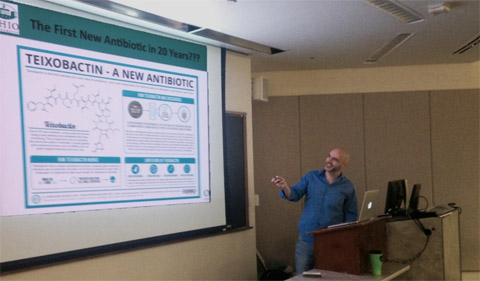Ellie Koewler ’15
Dr. Ronan Carroll, Assistant Professor of Biological Sciences, talked Feb. 4 to Anthropology students about his research in methicillin resistant Staphylococcus aureus, commonly known as MRSA.
When Dr. Sabrina Curran learned about his research, she realized that it had direct application for her Biological Anthropology course (ANTH2010) and would provide a bridge for her students between biological anthropology and a specialized field of study. This drug resistant pathogen is “an example of evolutionary change we can see happening in our current world,” she says.
In his lecture, “Antibiotics, Resistance and the Rise of the Superbugs,” Carroll talked about evolution on two scales, of all life over time and the specific changes to S. aureus within the last 20 years. “The process of antibiotic development and antibiotic resistance has been going on for billions of years, but then something happened to disrupt this balance about 70 years ago.” The introduction of penicillin led to a dramatic increase in the use of other antibiotics through today, making drastic evolutionary changes to S. aureus.
Carroll highlighted the staggering number of illnesses and deaths caused by antibiotic-resistant organisms, especially MRSA. Community-acquired MRSA is found even among perfectly healthy individuals, showing MRSA is evolving and spreading into different environments with much higher levels of toxins, compared with hospital associated MRSA strains.
Awareness and education among people on this topic is crucial to Carroll’s research. Popular antibacterial products do not kill MRSA bacteria and in fact contribute to superbug antibacterial resistance. New strategies are needed to offset antibiotic resistance because the bacteria will continue to evolve.
Carroll’s lecture fits within the class’s Foundations of Evolution unit. Biological anthropology studies mechanisms of evolution and diversity through primatology, genetics and fossil records. This semester, Carroll teaches Pathogenic Bacteriology (BIOS4230).
Curran is a new faculty member to the Department of Sociology & Anthropology and teaches Perspectives in Anthropology (ANTH3730 Controversies in Human Evolution) and Seminar in Biological Anthropology (ANTH4942 Research Methods) in addition to the introductory course. Her research interests include paleoanthropology and environmental and ecological selection pressure of our ancestors.




















Comments